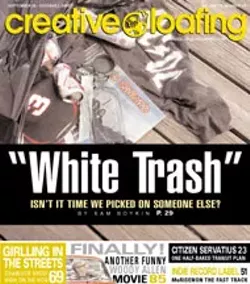Still, when CBS casting agents descended upon the Southeast last year looking for candidates for a new reality show called The Real Beverly Hillbillies, the groundswell of opposition that arose was fierece and immediate. This wasn't just shoddy, cliched treatment of Southerners, opponents cried, but an insult to all of America's poor whites. Once again, a skirmish had broken out in America's neverending battle with its own class system.
America's longstanding national mythology tells us we're a country without old Europe's hidebound class system; the truth, of course, is that the US has a large underclass that's been rendered nearly invisible through lack of attention. And if you're poor and white, you're actually doing good to be ignored; otherwise, you're openly mocked wherever you turn.
You know the stereotypes: the mullet-sporting, beer-swigging, pick-up-driving hick with charges pending. Or the trailer park princess wearing overtaxed spandex and fuchsia lipstick who does all her shopping at Wal-Mart with a litter of wailing kids in tow.
As time has progressed, so has the proliferation and variety of white trash stereotypes. The 90s alone ushered in the likes of Jerry Springer, Joey Buttafuocco, John Wayne Bobbitt, Courtney Love, Beavis and Butt-head, Kid Rock and Roseanne and Tom Arnold. Meanwhile, the hubbub surrounding The Real Beverly Hillbillies apparently sparked a brainstorm at other studios. A couple of weeks ago, UPN premiered The Mullets, a show centered around two blue-collar, wrestling-loving, beer-drinking brothers who sport the hairstyle that bears their surname. None other than 80s sex symbol Loni Anderson plays their mother, Mandi Mullet-Heidecker.
We've seen the belittling of people seen as coming from somewhere below the middle class in the media's treatment of Clinton accuser Gennifer Flowers and disgraced ice skater Tonya Harding who, although they were no doubt ridiculous in various ways, were ultimately dismissed as little more than "trailer trash." Closer to home, when the Loomis Fargo gang's leaders were revealed to be a collection of mobile home dwellers who went on a nouveau riche spending spree after the heist, the morning radio jokes and "What do you expect?" comments were often brutal in their stereotypes of poor whites.
But there's probably no greater example of the media's poor white bashing than that of Paula Jones. When she claimed in 1994 that Bill Clinton groped her and solicited sex while he was governor of Arkansas, Jones -- a low-income Arkansas state employee with a tacky wardrobe, squirrelly hair and trailer-park upbringing -- made an easy target. When Clinton defender James Carville attacked Jones by saying, "Drag a hundred dollars through a trailer park and there's no telling what you'll find," it was shocking not only because of its overt prejudice against the working class, but also because of the relative lack of public backlash it elicited. Other than her gauche hairstyle, the main slam against Jones was that she was "trailer trash." The assumption that mobile home dwellers are somehow a lower form of being has almost become routine in America.
Life a la double-wide
"Ours is the big gray doublewide with a Suburban in the driveway," says Kim Haxwell, directing me to her residence at Twin Lakes Mobile Homes, a sprawling, 250-mobile-home development in Fort Mill. In addition to the Suburban in the driveway, also out front are a portable basketball goal, a scattered collection of toys, and patches of shrubs and plants complemented with two wagon wheels and a little windmill garden ornament.
The trailer has four bedrooms and two bathrooms, and is more spacious than you'd expect after seeing it from the outside. Inside it's homey and neat, with family pictures covering the walls. Kim lives here with her husband, Brad, and their five kids, who range in ages from seven weeks to 13 years old.
There's a young boy with close-cropped blond hair sitting on the couch watching TV. The seven-week-old is in one of those automatic rockers, blissfully asleep in the corner. I see out the dining room window that the backyard resembles a playground, with several swingsets, slides and more toys.
Kim, 33, and Brad, first met in Michigan about 11 years ago, and after getting married, moved to the Charlotte area so Brad could help run his parents' pizza joint. However, things got off to a rocky start for the newlyweds. The restaurant soon went belly-up, and the couple found themselves facing a mounting number of bills.
"When my husband was younger he was wild with the credit cards," Kim said. "Financially we weren't doing too good. We had a car repossessed, and didn't have the best credit. We were living in a single-wide in Rock Hill at the time and needed a bigger place. Thankfully, the Lord led us to this double-wide."
Brad has long since recovered from the pizza joint fiasco and now supports his family as an operations manager for a building supplies company, often working 10 or 12-hour days. Before she became a full-time mom and homemaker, Kim worked as a manicurist at a salon in Fort Mill. She renews her manicure license every year for "something to fall back on" once all the kids are in school.
Kim was one of the few people who live in a trailer park who agreed to be interviewed for this story. When making initial queries to various trailer park residents, the responses I received ranged from puzzlement to suspicion to outright hostility. The stigma associated with living in a trailer park obviously runs deep, and most people were understandably defensive given the negative stereotypes - and the fact that I represented the media, which has led the way in perpetuating those negative images.
Nonetheless, Kim felt the stereotypes so misrepresented her and her family, the issue warranted her input. She stresses that she and her family have enjoyed life at Twin Lakes Mobile Homes, and with the exception of a couple of unruly kids with mostly absent or apathetic parents, they've never had any problems.
However, there are times when she feels self-conscious about her home. "My kids are involved with sports teams in Fort Mill, and there are some parents there who you might say are well-off. When their kids want to come over and play and they ask where we live, I feel a little funny saying a mobile home park. Some people just automatically think you must be poor."
Unlike some mobile home parks, most residents at Twin Lakes Mobile Homes own their trailers, and pay rent only on the lots. Kim says she hopes to move into a "regular, bigger house," not because of other people's perceptions, but to better accommodate her growing family. "It's not about where you live, it's about who you are and how you live your life. I see our trailer just like any other home in a subdivision; ours is just shaped a little different."
What's wrong with you people?
Just as the black community is stereotypically blamed for national problems like crime, drugs, and failings in public education, poor whites are regarded as the purveyors of other societal ills. The white working class is often blamed for everything from bad fashion, obesity, incest and child abuse to alcoholism, spousal abuse and out-of-wedlock motherhood, not to mention a never-ending obsession with Elvis. But the truth is that many of society's problems are just as common behind respectable suburbia's white picket fences, and many soccer moms or corporate execs share the same ills as the trailer park untouchables, most notably in the area of domestic violence.
"We get calls for help from every socioeconomic level," says Jane Taylor, coordinator of services for the Shelter for Battered Women in Charlotte. "We routinely talk to women who are a vice president's wife or the professor's wife. That's a very large part of our caseload. If we shelter 400 women and children a year, we'll work with twice that many who don't come here to stay, but contact us for guidance and advice. The so-called "working class' woman is going to be more inclined to call the police and use our shelter than the woman in Myers Park who doesn't want the police to pull up in her front yard. The media picks up on the working class stereotype simply because it's more visible."
Karen Parker, project coordinator for the Domestic Violence Healthcare project at Carolinas Medical Center, says she sees women from across the economic spectrum who are victims of domestic violence. "One minute we might see a woman who is low-income and living in public housing, and the next minute we might see an upper-class Dilworth mother whose husband is a prominent businessman," says Parker. "I've had that literally happen where, back-to-back, you get these two extremes."
While all cultural and ethnic groups share working-class roots, there's an unspoken assumption that if you're white, that's all the resources you need to be successful; if you haven't made it, then you must be some kind of goober or hillbilly.
"Terms like "hillbilly' are a class marker," says retired Appalachian State University (ASU) professor Dr. Jerry Williamson, who has spent much of his career researching Southern types and stereotypes in the media and culture. "The hillbilly represents the failure of white advancement. There's a definite racial component to it. How can you be white and be like that? You have no excuse for being poor. In some ways it's a double stigma."
Sherry Linkon, co-director of the Center for Working Class Studies at Youngstown State University, explains,"In a culture that believes in the possibility of upward mobility, for anyone not to make it, there must be something wrong with them. Not the economic system, not the educational system, not the lack of social support, but you. It's why no one wants to admit they're working class. It means you failed. You didn't make it up the class ladder."
Our national Holy Grail of ever-increasing prosperity can be an inspiration for many, but for the working poor it's often a painful reminder of others' perceptions of their "failure." Americans don't like to think of poverty as a national problem anymore, but a look at the numbers tells the stark story -- a story that's only getting worse during the current wave of job losses. According to the US Census Bureau, there were 32.9 million people in this country living in poverty last year; of those, 22.7 million were white and 8.1 million were black. (There are approximately 229.7 million whites and 35.9 blacks living in the US.)
"The poor are often used to make us feel better and privileged -- at least we have a job, a decent home and values," says Linkon. "It also allows us to feel like "we're' different from "them'; that "we' are all the same and "they' are a problem that we need to solve. This stereotype helps create a group of people so far outside from everybody else that it erases the class differences that exist among the so-called middle class.
"Lots of the public discussion about welfare reform was built on the idea that the poverty class was almost disabled, and by their own choices," Linkon continued. "And if we force them to stop that behavior, they will change and become more like "us.' But if you really look at this stereotype, it just doesn't stand up. The minute we start to flesh out those kinds of characters and look at them as human beings, they almost always become more sympathetic."
Escaping the stigma
Ken Bryant knows all about prejudice against poor whites, poor Southern whites in particular. He's seen it all his life. Bryant, now an editor at a newspaper in South Carolina, agreed to talk to us for publication only if we didn't use his real name, reveal what Carolina town he's from or where he is employed. He says the stigma of a "white trash" youth isn't something he wants to deal with anymore.
"I grew up in a part of town called "The Panhandle,' which was pretty rundown -- holes in roofs, holes in porches, things like that. I mean, this was a part of town the mill folks looked down on; I had some school friends who weren't allowed to come to my house to play after school because of where I lived. My father left my mother after my little sister was born when I was four. I have an older brother who went into the Air Force. Momma worked in the spinning room at one of the cotton mills but she never could really make ends meet. I don't think she knew much about managing money and her parents and her sisters were 50 miles away so they couldn't help much. A lot of times I'd go to school without breakfast. Grammar school was a very rough time for me."
Ken was what is now called dyslexic. In the 1950s, he was considered a "dummy" because he couldn't read.
"That was the most frustrating, awful thing. I wanted to read, I had a huge curiosity about things, I had a good mind, but I just couldn't make out what the words I was looking at were saying. Looking back, it was really humiliating. Kids called me stupid and, being a kid, you know, I started to believe they were right.
Suddenly, midway through third grade, "it just cleared up," says Bryant. The words and sentences began to make sense and the kid who had been passed on to grade three even though he received mostly D's and F's, caught up with his classmates by the end of the year. By then, though, the family had moved to another rental home in another part of town and he was in a school attended primarily by kids from middle and upper middle class homes. The moron jokes disappeared, but the jibes about his family's poverty became brutal.
"Linthead, Patches, White Nigger, I heard it all from some of the meaner kids. I almost got used to that," Bryant explains. "What I never got used to was not being able to do some of the things the middle class kids did: going to the swimming pool in the summer -- my brother and I always swam in the river; county fairs; I didn't see a lot of movies growing up; anything, really, where you had to pay to get in, we were pretty much left out."
In high school, Ken got lucky. He had become an "A's and B's" student and one of his English teachers, impressed by his intellectual curiosity and determination, took him under her wing.
"Mrs. Jones (not her real name) lent me a lot of her own books during the last couple of years of high school and she took the time to talk to me about them after school; George Eliot or Thomas Hardy or Hemingway -- those have been favorites all my life."
Mrs. Jones, along with a 12th grade government teacher, talked to Ken's mother about college scholarships. "Momma was thrilled, just beside herself. She almost couldn't believe it, really, but I'd told her since I started high school that I wanted to go to college."
Eventually, Ken went to a state university on a near-full scholarship and wound up with a Masters degree in journalism. He worked his way up through three newsrooms until he reached the editor's position he holds today. He's married with two children in college and is "thoroughly American middle class," he says, chuckling. "The lawn mower, the grill, the two cars, the works. My deepest satisfaction, along with my wife and children, is that Momma is still here and I've been able to make her life easier." Ken stared for a few moments into the pines in his large backyard. "I don't see how she raised us as well as she did, really; I don't know if I could do it.
"The thing is," Ken continues, "I was lucky. And that's all it is. Momma and my teachers looked after me; that's something that didn't happen to some other people I knew from my socioeconomic background -- heck, from my own neighborhood -- who had just as much potential as I did. They just weren't as lucky as I was. (chuckles) The fact is, a lot of people who've done well in life don't realize how much luck played a part in their success -- I mean the luck of being born into a family that could do things like pay for piano lessons, send you to college, get you out of trouble now and then. It's a lot easier for the well-to-do to think that "those people' stay poor because they're unworthy, as if poor people are all born dumb and lazy and what else can you expect from them? It's easier for successful people to think they got ahead because they deserved it, because they worked for it. Well, the fact is a lot of people deserve success and work hard for it and they never get it, simply because they hit that brick wall. They don't have access to the resources that most people take for granted. Not too many people think about that kind of thing; it's too uncomfortable for them, I guess.
We asked Ken several times to let us use his real name, but he insisted on privacy. "I tell you why," he explained. "It's because I still see poor folks being made fun of all the time -- if you're poor, you're "trailer trash' or you have those "bubba teeth' you see at convenience stores or whatever. And I've seen people like me who made it out of that background who are still looked at sideways because of it, no matter what they become. Also, I've seen people, I'm thinking of a couple of old friends in particular, who were brilliant, simply brilliant people, but because they were never taught how to act in higher social circles or how to dress for an interview or they kept their thick accent, they . . . well, they got screwed, there's no other way to put it. And for no reason other than they were seen as "white trash in disguise' as one of my not-so-distinguished colleagues at the newspaper once put it."
"Our life is complete here."
A few trailers up from Kim and Brad Haxwell in the Twin Lakes Mobile Home Park live David and Merry Kammerer with their five children, ages from 3 months to 7 years. Merry, 34, and David, 51, moved into the Twin Lakes Mobile Home Park about four years ago. At first, they rented out one of their trailer's three bedrooms to a young girl to help make ends meet. In 2000, the couple took over as the development's property managers, which brings home less than $25,000 a year.
"It's not much, especially when you have a family of seven," Merry said. "We've got the biggest single-wide you can get, but it's still not big enough for us and five kids. We're hoping to move into a bigger double-wide.
"We have to budget our money, but we're not struggling," Merry continued. "If we made $40,000 a year, we might be able to afford a moderate house. But houses are just so expensive. With a mobile home you can get something new, and you don't have to have really good credit. But I could care less if I lived in a big two-story house. That stuff doesn't matter. I feel like our life is complete here."
Like the Haxwells, Merry and David's yard looks like a playground, with a slide, a little pool, various toys, balls and plastic bats strewn about. There are several dozen pairs of shoes - sneakers, boots, galoshes - piled up on the porch near the front door.
As managers of Twin Lakes Mobile Homes, they're in the unenviable position of having to sometimes evict their neighbors. Merry estimates that during their first year as property managers, they evicted over 15 people, mostly because of drugs. As a result, they've had obscenities spray-painted on the office, and all four tires on their "89 Aerostar Van slashed.
"It's been tough," Merry admits. "You have people who drink and do drugs, they don't want to work, and they have a million excuses why they can't pay their rent. It's a hard thing to deal with. My husband is a very merciful man, but when he took this job he had to toughen up. There are a lot of people here who don't like him."
Given all this, one might assume that if anybody would subscribe to the stereotype that poor whites are shiftless dullards, it would be Merry. However, she takes exception to those stereotypes, particularly those pertaining to folks who live in mobile homes. For one, Merry was born and raised in a working-class family in Columbia, SC, and takes pride in her roots. But at the same time, she readily admits that she grew up around folks who some would call rednecks or white trash. It's an ambiguous position that many folks share.
"There are people in any area who are not going to take care of their house or their yard," Merry said. "My dad is an alcoholic, so I know about all the junk associated with lower-income people, evictions, abuse -- all that stuff goes hand in hand. When you have money problems, all your other problems seem exaggerated and you want to escape them.
"Just living in this park has helped me not look at things in such a stereotypical way," Merry continued. "There's something decent in everyone. You can't discount a person's life based on their appearance or where they live."
Merry adds that she often faces prejudices herself -- albeit most of them discreet, which makes them all the more insidious -- and says it's been hard not to develop a bit of a complex.
"Our kids play soccer at Calvary Church," Merry said. "A lot of the other families there live in ritzy areas like Piper Glen, and I definitely feel a little self-conscious when people ask us where we live or what we do. I always say I manage a "mobile home community,' because when you hear "trailer park,' all these visions come into your head. They know we don't make a whole lot of money, and that kind of separates us from them. I don't even think they know they're doing it, but sometimes I can really sense that separation. I always wonder if we invited these people to our house would they be willing to come inside and have a glass of tea? And what would they think?"
As for terms like trailer trash and how the media portrays working class whites, Merry said, "It's frustrating and embarrassing. The media will always take something and exaggerate it and exploit it to the nth degree. The problem with the media -- and the world in general -- is that we fail to see the value of the human being as an individual. Whether they're a big, brawly New Yorker or a Southern redneck. Each person has value. But the media doesn't care about that."
The proposed CBS show The Real Beverly Hillbillies is now in limbo, although many in the industry feel it will eventually be produced when and if the criticisms have died down. CBS has played its card close to the vest and now states that the program's premise isn't to ridicule anyone, but "to question social mores." Casting director Marty Keener Cherrix, who visited the NC mountains last November, insisted she is "not looking to perpetuate the stereotypical mountain image," but instead hopes to find "mountain people with good mountain values." Others at CBS have characterized the series as "a great fish-out-of-water story," and says the show will have a loose structure similar to The Osbournes" Despite CBS brass' declared intentions for the show, given today's reality-TV climate, one can easily envision the show featuring the biggest rubes CBS could find -- or at least people willing to play the part -- blundering and aping their way around Beverly Hills in an open-mouthed, gap-toothed stupor. Moreover, you have to wonder about a show when network brass say its template is a program in which the main character is drug-addled, lumbering and barely intelligible. But then again, nearly eight million viewers tuned in each week to watch him during the show's heyday. In other words, move over Ozzy, here comes Jethro.
Editor John Grooms contributed to this story. Contact Sam Boykin at sam.boykin@cln.com or (704) 944-3623.
Latest in Cover
More by Sam Boykin
-

Divine evolution
Nov 11, 2015 -

The Agony & The Ecstasy
Jun 21, 2012 -

'Dynamite' diet with nutritionist Angela Gallo
Jan 18, 2011 - More »
Calendar
-

Coveted Luxury Watches
-

TheDiscountCodes
-

Celebrate AAPI Food, Culture, & More at Panda Fest Charlotte! @ Ballantyne’s Backyard
-

Improv Game Night @ CATCh
-

Lake Hickory Haunts 2025 @ Lake Hickory Haunts










